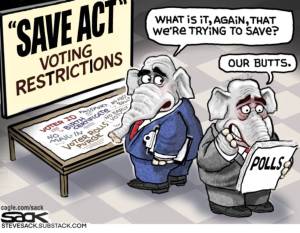Masses gain access to the world — in replica form, that is
Published 3:55 pm Wednesday, April 2, 2008
LAS VEGAS — Warren Buffett, of course, and then Bill Gates, but can you name the third-richest American? He is Sheldon Adelson, 74, whose net worth is, according to Forbes, $26 billion. He made his first fortune by founding and then selling a computer exposition here. Today he is thriving in part thanks to Asians who gamble here and in Macao, a tiny appendage of China. His Las Vegas Sands Corporation is the largest investor in China, ever.
Compact and combative as a bantam rooster, Adelson, son of a Boston cab driver, used $128 million to buy the old Sands, the haunt of Frank Sinatra’s Rat Pack. Adelson tore it down and built the $1.5 billion, 4,000-room Venetian. Two months ago it became the world’s largest hotel when it opened the $1.9 billion, 3,000-suite Palazzo hotel, which is physically connected to the Venetian. In Macao, Adelson has two resorts, including a Venetian with a casino three times larger than the largest in Las Vegas.
He is spending upward of $9 billion more to build 13 additional casino hotels in Macao, and about $4 billion on one in Singapore. Next? Perhaps India, Japan, Korea, Thailand. Certainly Bethlehem (Pennsylvania, that is — really).
Macao’s gambling revenues, which surpassed the Strip’s in 2006, soared 46.6 percent last year to $10.4 billion. Macao’s February revenues were up 67 percent over February 2007. Las Vegas is largely immune to U.S. economic cycles: In January, the Strip’s casino gambling revenues fell only 1.3 percent, and a few “whales” could make up that margin over a weekend.
Whales, in the language of Las Vegas, are, Adelson says, those who can win or lose $3 million in one stay. There are only a few thousand whales in the world, but they are multiplying fast in China — thank you, the People’s Republic. Adelson says that when 60,000 people a day are gambling at Macao’s Venetian, 40 percent of the casino’s revenues come from 59,700 of them, and 60 percent from 300 others, probably including three to eight whales. In the Venetian here, 20 percent of the gamblers provide 80 percent of the revenues. Business cycles do not dent Adelson’s confidence that the rich will always be with us: “The upper end is never vulnerable.”
Adelson brandishes for a visitor a June 20, 1955, issue of Life magazine, the cover of which asks if Las Vegas is “overextended.” The city then had fewer than 3,000 rooms. Today it has 138,000 and 45,000 more are under construction or planned. Although Adelson thinks gambling will remain this city’s motor and scoffs at the notion of Las Vegas becoming primarily a “family destination,” he does think it will become to Southern California what south Florida has been to the Northeast. What Northern winters did for Florida, California’s government (high taxes, low performance) will do for Las Vegas.
Far from threatening Las Vegas, state governments, America’s foremost promoters of gambling, have, Adelson says, “enlarged the market.” State lotteries (and casinos — 28 states have them) whet people’s appetites for a trip to gambling’s Mecca.
A long-running show at the Hilton here is “Menopause: The Musical.” While the number of Americans over 65 has increased 20 percent since 1990, in Nevada the number has increased more than 100 percent. Poet Philip Larkin once said he would like to go to China if he could be home for dinner. Adelson and other makers of modern Las Vegas have obliged people like Larkin, sort of.
The Venetian has gondolas plying indoor canals that, unlike Venice’s, do not smell: “Score one for the Americans — when they rebuild Europe,” Paul Cantor of the University of Virginia writes, “they correct it, they improve it, they get it right.” Las Vegas’ hotel casinos also include Paris, and New York New York. Las Vegas, says Cantor, “fulfills a deep-seated American dream — to be able to pack the whole family into the station wagon and drive to Europe.”
Frommer’s guidebook suggests that there should be a Hoover Dam Hotel and Casino — why drive 30 miles when you can see a replica on the Strip? This, says Cantor, is democracy — giving the masses access to the world, albeit radically reduced.
Thanks to Adelson, Macao has its Venetian — a replica of a replica of a city. So China has passed into postmodernism’s erasure of distinctions between high and low culture, and between originals and copies, without yet achieving modernity. Buffett and Gates may still be richer, for now, but Adelson’s achievements astonish and multiply.
George Will is a Washington Post columnist. His e-mail address is georgewill@washpost.com.


